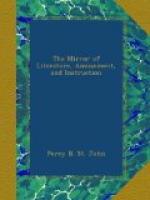* * * * *
SCRAPS.
The Court Journal, describing a Study in Windsor Castle, says—“The first of a series in the plain English style. The ceiling is white, with a cornice of simple Grecian design!”
According to a recent traveller, fat sheep are so plentiful in the Brazils that they are used as fuel to feed their lime-kilns.
Supposing the productive power of wheat to be only six-fold, the produce of a single acre would cover the whole surface of the globe in fourteen years.
A Philadelphia Paper announces the arrival of the Siamese Twins in that city, in the following manner:—“One of the Siamese twins arrived here on Monday last, accompanied by his brother.”
The term Husting, or Hustings, as applied to the scaffold erected at elections, from which candidates address the electors, is derived from the Court of Husting, of Saxon origin, and the most ancient in the kingdom. Its name is a compound of hers and ding; the former implying a house, and the latter a thing, cause, suit, or plea; whereby it is manifest that husding imports a house or hall, wherein causes are heard and determined; which is further evinced by the Saxon dingere, or thingere, an advocate, or lawyer. [Hus and thing (thong) a place enclosed, a building roped round.]—Atlas.
Segrais says, that when Louis XIV. was about seventeen years of age, he followed him and his brother, the Duke of Orleans, out of the playhouse, and that he heard the duke ask the king what he thought of the play they had just been seeing, and which had been well received by the audience: “Brother, (replied Louis,) do not you know that I never pretend to give my opinion on any thing that I do not perfectly understand.”
* * * * *
ELECTIONEERING ADVICE.
Among the curious Autograph Letters, at Sotheby’s late sale, there was a curious one of Sarah, Duchess of Marlborough, dated August 16th, 1740, viz. A canvassing letter in favour of two Members for Reading; with the following electioneering advice:—“Nothing but a good Parliament can save England next Session; they are both very honest men, and will never give a vote to a Placeman or a Pensioner.”
P.T.W.
* * * * *
THE NATIONAL DEBT.
George the Third came to the throne in 1760, and found the national debt 120 millions; he reigned 59 years, and left the national debt 820 millions, 700 millions more than at his accession, increasing on the whole period about 36 thousand per day, or nearly 23 pounds per minute. At the beginning of his reign the taxes amounted annually to 6 millions; at the ending 60 millions.




